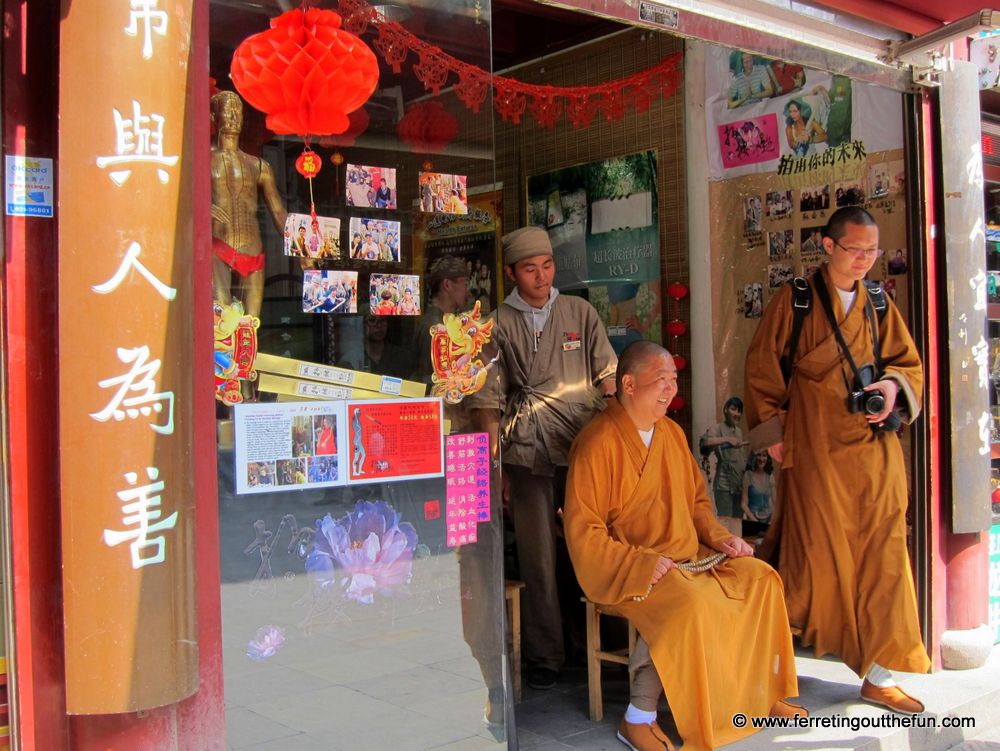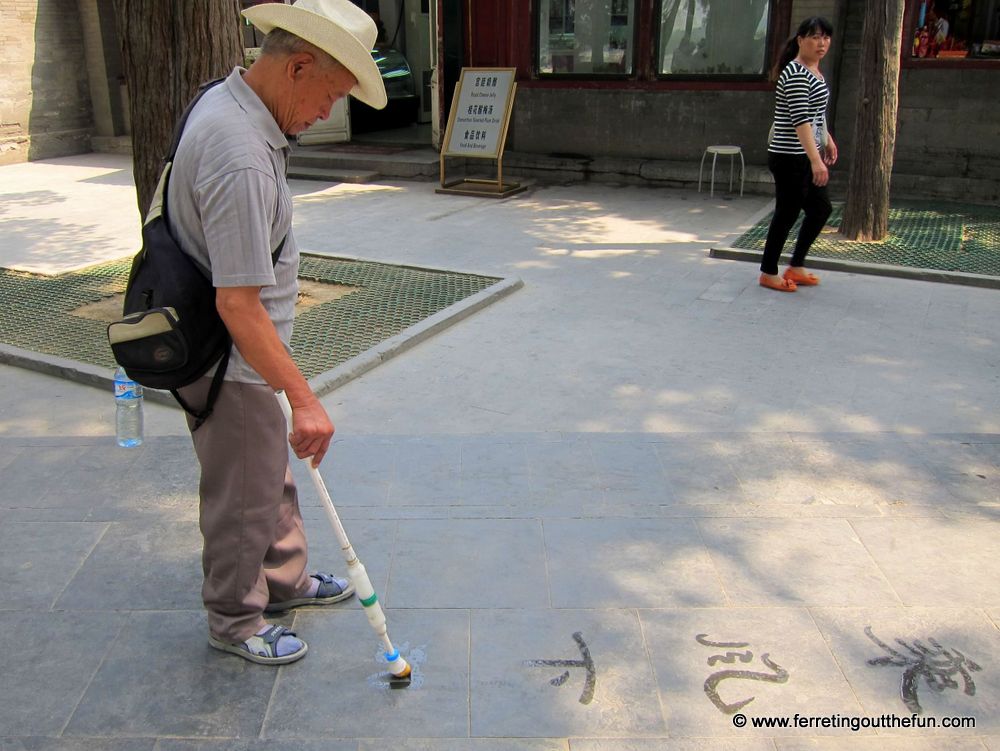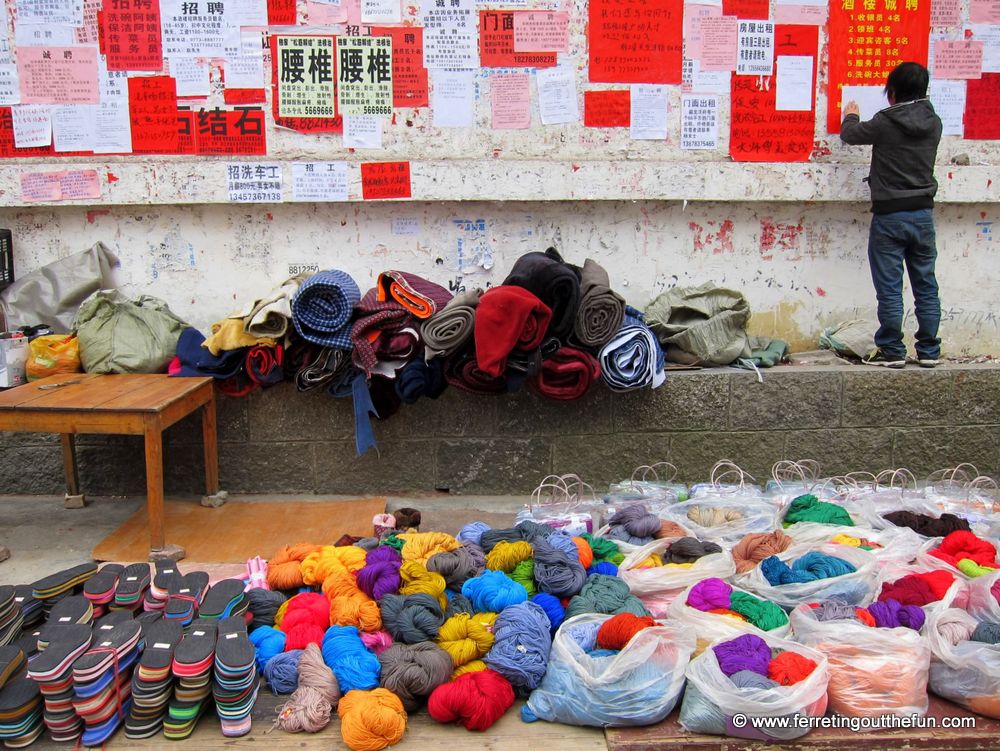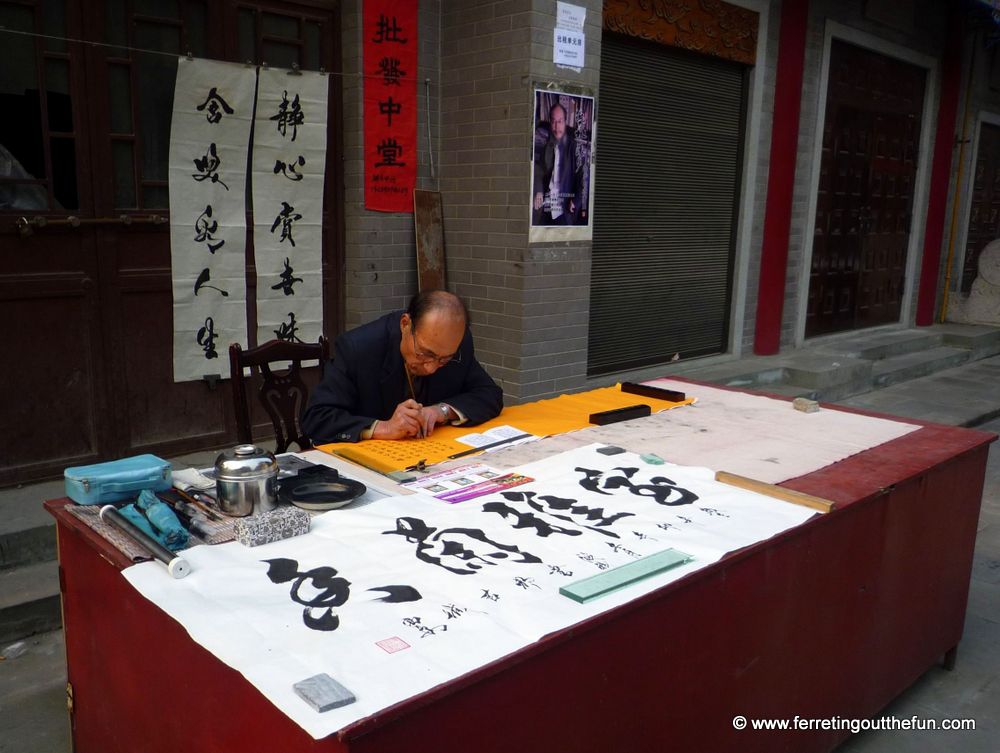In my opinion, one of the top reasons Westerners are reluctant to travel to China is fear of the language barrier. The elaborate Chinese characters are awfully intimidating and the challenge of speaking and being understood might seem insurmountable. While I failed in my attempt to master the language, I did learn enough Mandarin to survive in Shanghai as an expat for two years.
There is a surprising amount of English spoken in cosmopolitan Shanghai, but a little of the local language will still go a long way. Just be patient and smile! Like my mom always said, you will catch more flies with honey than vinegar. My tips on haggling can be found at the end of this post.
General Words and Phrases
-
Nǐ hǎo (你好) – hello – pronounced knee-how
-
Zàijiàn (再见) – goodbye – pronounced dzeye-jee-ehn
-
Xièxiè (谢谢) – thank you – pronounced sheeyeah-sheeyeah
- Bù kèqì (不客气) – you’re welcome – pronounced boo-kuh-chee
- Shénme (什么) – what? – pronounced shuhmah (you will likely hear this one a lot as people – especially taxi drivers – might not get what you said the first time around)
-
Duì (对) – yes or right – pronounced duay
-
Bù (不) – no – pronounced boo
- Tīng bù dǒng (听不懂) – I don’t understand – pronounced ting-boo-dong (this is probably the most important phrase you can learn)
- Míngbáile (明白了) – I understand – pronounced ming-buy-lah
- Duìbùqǐ (对不起) – I’m sorry – pronounced duay-boo-chee
- Méi bànfǎ (没办法) – it can’t be helped – pronounced may-ban-fah
Words for Ordering Food
-
Zhège (这个) – this – pronounced jay-guh
-
Fàn (饭) – rice – pronounced fahn
-
Miàntiáo (面条) – noodles – pronounced mee-ehn-tee-ow
- Xiǎo lóng bāo (小笼包) – dumplings – pronounced shee-ow-long-bow
-
Zhūròu (猪肉) – pork meat – pronounced jew-roe
-
Jīròu (鸡肉) – chicken meat – pronounced gee-roe
-
Niúròu (牛肉) – beef – pronounced nyew-roe
-
Shūcài (蔬菜) – vegetables – pronounced shoe-tseye
-
Dòufu (豆腐) – tofu – pronounced doe-foo
Words for Taking a Taxi
Many of Shanghai’s taxi drivers aren’t actually from the city and most don’t speak any English. They also may not be familiar with all the city’s streets. If you are able to pronounce street names correctly in Chinese, the best course of action is to tell the driver to take you to the closest major intersection. Otherwise, show the driver the address in Chinese characters or get someone at your hotel to tell them where you want to go.
-
Qù nǎlǐ (去哪里) – where going? – pronounced chew-nah-lee (the taxi driver will ask this when you get in the car)
- Wǒ qù (我去) – I go to – pronounced woah-chew
-
Lùkǒu (路口) – intersection – pronounced loo-koh
-
Zhèlǐ hǎo (这里好) – here is good – pronounced juhlee-how
-
Yòubiān (右边) – right side – pronounced yo-bee-ehn
- Zuǒbiān (左边) – left side – pronounced dzwhoa-bee-ehn
- Yīzhí zǒu (一直走) – keep going straight – pronounced eee-jer-dzoh
-
Xiànjīn (现金) – cash – pronounced shee-ehn-jean
-
Shuākǎ (刷卡) – swipe card – pronounced shuah-kah (this is what you would say if you want to pay by credit card, though I’d pay cash if you can so there’s no risk of being scammed)
Tips for avoiding taxi scams (as of 2013): Look for the green and white cars and vans with the yellow phone number printed on the side. Other reputable companies have cars that are white or blue. Never get into a taxi without a phone number on the side of the car. Avoid the burgundy taxis, whose company is rumored to overwork its drivers and have a higher accident rate, as well as all unmarked cars. Steer clear of cars with tinted windows.
A standard ride within the downtown area should cost no more than 30 RMB. Some cars have tampered meters so if it looks like you are being “taken for a ride,” kindly but firmly ask to be let out at the nearest intersection. I made the mistake of getting into a burgundy car with tinted windows and the meter ran up faster than a teenager’s cell phone bill! The driver didn’t balk when I asked him to stop the car (“xiàchē zhèlǐ hǎo”) and I played it safe by paying him anyway.
Words for Shopping
When it comes to making a purchase, don’t be afraid to do some miming. I succeeded in having custom framing done using only the Chinese word for “this” and lots of pointing and gesturing. Ditto for having things altered by a tailor. My go-to seamstress always laughed at my antics but the job was almost always done as I’d asked/mimed. People will generally do whatever it takes to make a sale!
Custom-made clothes will generally be ready one week from the day you place the order. If you need it done faster, be prepared to pay for it. When saying the sizes given below, it helps to accompany them with coordinating hand gestures.
- Wǒ yào (我要) – I want – pronounced woah-yow
- Bùyào (不要) – don’t want – pronounced boo-yow
-
Duōshǎo qián (多少钱) – how much money? – pronounced dwoah-shao-chee-ehn
- Tài guile (太贵了) – too expensive – pronounced tai-guay-lah
-
Kěyǐ (可以) – can or okay – pronounced – kuh-yee
- Da (大) – big – pronounced dah
- Zhōng (中) – middle or medium – pronounced jong
- Xiao (小) – small – pronounced shee-yow
How to haggle: Say “wǒ yào zhège” while holding up the item you want to buy. Then ask “duōshǎo qián?” You will be shown a price on a calculator. Know that the price will be inflated by anywhere from 20 to 50 percent.
Don’t begin to bargain unless you are genuinely interested in buying the article. Respond with “tài guile” and enter your counter offer. Smile! The seller might act like you just insulted her grandmother, but that’s just part of the show. Go back and forth until you reach a price you are both happy with and you say “kěyǐ.” Keep things friendly and don’t squabble over a few pennies. You’re trying to get a fair price, not stick it to the shop keeper.
If the seller won’t budge, walk to the next store which likely has something similar. The shop keeper may chase after you calling out a lower price. If it’s just a little bit higher than what you offered, it’s nice to accept and allow the seller to save face with his or her neighbors.
Have you been to China? What words did you find most useful?








This is SUCH a helpful guide and I wish you had written it 2 years ago before we visited China! 😀
To be fair, Tony & I made a concerted effort to learn some Chinese before we left and to this day I still remember key words and phrases. But we bombed big time when we reached China itself, as pretty much NO ONE could understand us at all. I wonder how much of this was due to us starting in Beijing? We’d go into restaurants and point at things on the menu and say (in Chinese) “I want this” and just get blank stares. It was so bad, that it broke our spirit and we eventually just stopped trying.
I do wonder if the problem wasn’t really us though, because even though we didn’t speak Chinese for a few months, we tentatively broke it out in Taiwan and had MUCH more success. And even recently here in Nepal, we met a fellow trekker who was from Shanghai and we explained how much difficulty we had in China and he asked us to say some things—he could understand us! Most people outside of China that we encounter, if we speak Chinese they may need to pause and try to figure out what we’ve said (perhaps our tones are wonky…), but they can generally get the gist. The man from Shanghai told me not to feel so bad because normally when he goes to other parts of China he can’t understand what anyone is saying anyway… 😉
Oh yeah, Beijing is tough. Having learned the Shanghai brand of Mandarin, I couldn’t understand anyone in the north. They all sound like pirates, with “arh” at the end of nearly every word! And if you were going to restaurants that didn’t see many foreigners, the waitstaff was probably stunned. I got that sometimes – a person was just so taken aback that a foreigner was talking to them they went mute. 40 years of extreme communist rule during which we were thought of as “foreign devils” didn’t create an atmosphere that was conducive to cross-cultural communication. I also met some Shanghainese folks in Hong Kong who were as nice and friendly as they could be – and they could understand every word I said and vice versa. It’s just a Mainlander mental block!
We spent a couple of months in China in 2011. Traveling independently was challenging at times, but we really enjoyed our visit. Language was a struggle, although we were a tiny bit ahead of the game since I speak Japanese (well, the speaking is totally irrelevant; it’s recognizing some characters that was helpful. ) I could pick out rice or noodle dishes from the menu, read what kind of meat was in them, etc. I still couldn’t pronounce anything, but I sometimes had a general idea. Directions are the same as well (north east south west), and numbers. We tried hard to pick up some words for buying things and saying please and thank you, but all the tones were super challenging. I felt like we could have someone tell us the correct tones over and over, and still not get it right. Good tips on haggling. It’s an intricate dance in some ways, isn’t it? Thanks for the informative article!
I still remember my first attempt at haggling. The price offered by the seller was so outrageous I nearly laughed. She acted so aggrieved by my counter offer I really thought I’d hurt her feelings. Then she started dropping her price in 100 RMB increments and I got wise to her techniques 🙂
The tones were impossible for me. In theory I could understand how they worked, but in regular conversation I couldn’t pick them up or pronounce them. Most people could still figure out what I was saying – except for Shanghai’s taxi drivers. I often had to repeat myself three or four times, altering the intonation slightly until something clicked for them. In two years, I was never taken to the wrong address!
I have much respect for people who travel independently in China. We spent two weeks in Yunnan and don’t know how we would have gotten around without speaking Mandarin. After buying our bus tickets, the agent told us to “get on the yellow bus” – in Mandarin. Who knows where we would have ended up if we hadn’t been able to understand her!
It’s such a great feeling to know all of these phrases by heart. Life in China is so much easier when you speak Chinese! I really can see the benefits now.
It really does improve your quality of life to be able to communicate in the local language. I wish I had learned even more!
Great post! I’m definitely ear marking this one should we end up being posted to China! Thank you! 😉
Thanks! Hopefully it will be a good resource for you!
I’m glad I had you with me, especially in the taxis. They were scary.
I’m just not a new language person. I can’t remember the words.
Maybe if I lived in the area long enough, I might get the hang of it.
I did really enjoy my two trips to Shanghai. There is so much to see
and do and so much shopping to fit in. Can’t wait for the next posting.
Lots of new experiences to be had.
I found your site from a comment you left in response to a guest post I have published at Nomadic Samuel. So glad that I clicked over here – this is a fantastic resource. I find your phonetics much more useful and easier to follow than others I’ve seen. Yay!
Great post! I definitely found languages intimidating when I first came to Asia – they’re a lot less intuitive than Latin-based languages for English-speakers. It’s so true that miming really works. It felt embarrassing for me at first, but then usually once I start doing it, the locals do it right back, and then I feel less ridiculous.
I wish the Chinese had mimed back at me, that would have been super entertaining!
Darn. Could’ve really used this a month ago…
I hope you enjoyed your time in China anyway!
Great guide! I must say that the language barrier is definitely a big thing holding me back from going to China. The ease of pronunciation errors is intimidating!
Thanks! I’m still amazed I was able to make myself understood over there considering I was incapable of hearing and pronouncing the tones! Sometimes I had to repeat myself three or four times, but eventually they got it! Patience is key.
Great post, really good info for travelers :). When I went to Hong Kong I stayed at the YMCA and the taxi driver had no idea what I was talking about when I said “YMCA” (even though the sign is about 50 ft high). I learned to take a card or hotel key with me. Language such a barrier in China!
Very helpful post!
Frank (bbqboy)
Thanks, Frank! Carrying a card for your hotel is a really good tip!
After 2 years of studying Chinese as a kid (my parents made me) I’ve gotten pretty good at reading and writing the characters… but getting the tonal right? Impossible! I’d love to visit China someday though and I have a feeling it’ll be a tough yet interesting experience.
Knowing the characters will be a huge help, especially in some of the more remote regions where English isn’t as widely spoken. The people in those parts will also be more receptive to your spoken Chinese. The big city folks can be a little gruff. I hope you get to go!
So right! Many people say to me it’s the language that scares them. But to be fair, in most cities all the signage is in English and Chinese (though some side alley restos don’t, etc.) so that should make it easier. When I was in Moscow, everything was in Cyrillic, while pretty looking letters, I had no clue what I was looking at all the time!
I was in Moscow for such a short time, memorizing the alphabet was pointless. Or maybe not, hindsight being 20/20.
I am so sharing this guide for it’s usefulness and I agree with another commenter, you’ve made the pronunciation easier than any post I’ve seen on it.
I hope this will be useful to people interested in going to China. It’s really not that scary of a place! I plan to visit Russia in 2014 or 2015 so it will be interesting to muddle through those language challenges. The Greek alphabet was like, well, Greek to me and I managed just fine. But I’ve never been one to shy away from a challenge 🙂